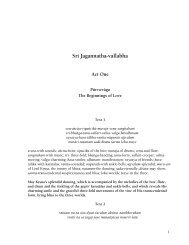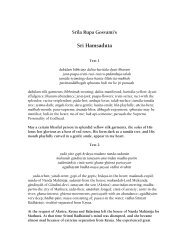Srimad Bhagavatam, Volume 3
Srimad Bhagavatam, Volume 3
Srimad Bhagavatam, Volume 3
You also want an ePaper? Increase the reach of your titles
YUMPU automatically turns print PDFs into web optimized ePapers that Google loves.
<strong>Srimad</strong> Bhagawatam, First Canto, <strong>Volume</strong> Three<br />
cannot tolerate disrespect for the most important man the Brahmin. Human<br />
civilization means to advance the cause of Brahminical culture and to<br />
maintain it, protection of cow is essential. There is a miracle in the milk as it<br />
contains all the necessary vitamines for sustaining the human physiological<br />
conditions for higher achievements. Brahminical culture can only be advanced<br />
when man is educated to develop the quality of goodness and for this there is<br />
prime necessity of foodstuff prepared with milk, fruits and grains. Maharaj<br />
Parikshit was astonished to see that a black Sudra dressed himself like a ruler<br />
but was attempting to insult the cow the most important animal in the human<br />
society.<br />
The age of Kali means mismanagement and quarrel. And the root cause of<br />
all mismanagement and quarrel is that worthless men qualified with the<br />
modes of lower class of men, without any higher ambition of life becomes on<br />
the helm of the state management to represent falsely the ruler. Such lower<br />
class of man on the post of a king is sure to hurt first the cow and the<br />
Brahminical culture and thereby to push the whole society towards hell.<br />
Maharaj Parikshit, trained up as he was, got scent of this root cause of all<br />
quarrel in the world and thus he wanted to stop it in the very beginning of the<br />
affairs.<br />
Sounaka uvacha:—<br />
Kasya hetor nijagraha kalim digvijaye nripah<br />
Nrideha chinhadhrik sudraka asou gam yah padahanat<br />
Tat katthatam mahabhaga yadi krishna kathasrayam.<br />
Sounakauvacha—Sounka Rishi said, Kasya—for what, Hetor—reason,<br />
Nijagraha—sufficiently punished, Kalim—the master of the age of Kali,<br />
Digvijaye—during the time of his world tour, Nripah— the king, Nrideha—<br />
royal person, Chinhadhrik—decorated like, Sudraka—lowest of the Sudra,<br />
Asou—he, Gam—cow, Yah—one who, Padahanta—struck by the leg, Tat—<br />
all that, Katthatam—please describe, Mahabhaga—Oh the great fortunate,<br />
Yadi—if however, Krishna—about Krishna, Kathasrayam—related with his<br />
topics.<br />
Sounaka Rishi enquired, "Why did Maharaj Parikshit simply punished<br />
him although he was the lowest of the Sudra because he dressed himself<br />
like a king and at the same time struck a cow by the leg ?" and said "<br />
please describe all those incidences if they are related with the topics of<br />
Lord Krishna.<br />
Sounakadi rishis were astonished to hear that the pious king Maharaj Parikshit<br />
simply punished the culprit suffciently and not killed him. This suggests that a<br />
pious king like Maharaj Parikshit should have at once killed an offender who<br />
wanted to cheat the public being dressed like a king and at the same time dare<br />
to insult the purest of the animal like a cow ! The Rishis of those days,<br />
however could not even imagine that in the advanced days of the age of Kali<br />
lowest of the Sudras shall be elected as admistrators and open organised<br />
slaughter houses for killing the cow (?) Any way although such topics, as to<br />
hear about a Sudraka who was cheat and insulter of a cow, were not very<br />
much nteresting for the great rishis still they wanted to hear about it if the<br />
event had any connection with the topics of Lord Krishna. They were simply<br />
interested in the topics of Lord Krishna and any thing that is dovetailed with<br />
the narration of Krishna was worth hearing for them. There are many topics in<br />
the Bhagwatam about sociology, politics, economy, cultural affairs etc but all<br />
of them are in relation with Krishna and there fore all of them are worth<br />
hearing. Krishna is the purifying in gredient in all matters never mind what it<br />
is. In the mundane world everything is impure on account of its being product<br />
of three mundane qualities. The purifyfng process is, however Krishna.<br />
Athaba asya padambhoja makarandaliham satam<br />
Kimanyaih asada alapair ayuso yad asadbyam.<br />
Athaba—otherwise, Asya—of Him (Lord Krishna's) Padambhoja—lotus feet,<br />
Makaaradaliham—of the those who lick up the honey out of such lotus<br />
flower, Satam—of those who are to exist eternally. Kimanyair—what is the<br />
use of anything else, Asad—illusory, Alapair—topics, Ayuso—of the<br />
duration of life, Yad—that which is, Asadbyam—unnecessary waste of life.<br />
Alternatively if they are related with the devotess of the Lord who are<br />
accustomed to lick up the honey available from the lotus feet of the Lord;<br />
otherwise what is the use of such topics which are simply meant for waste<br />
of the duration of valuable life.<br />
Lord Krishna and His devotees both are on the trancendental plane therefore,<br />
the quality of the topics of Lord Krishna or that of his pure devotess are<br />
equally good. The battle of Kuruksnetra is full of politics and diplomacy but<br />
because the topics are related with Lord Krishna therefore the Bhagwat Geeta<br />
is adored all over the world. There is no need of eradicating politics<br />
economics sociology etc which are mundane to the mundaners but to a pure<br />
devotee who is actually related with the Lord, such mundane things are<br />
transcendental if dovetailed with the Lord or with his pure devotee. We have<br />
so far heard and talked about the activities of the Pandavas and we are dealing<br />
with the topics of Maharaj Parikshit but because all such topics are related<br />
with the Lord Sri Krishna they are all transcendental talks and pure devotees<br />
36<br />
have every interest in hearing them. We have already discussed this matter in<br />
connection with the prayers of Bhismadeva.<br />
Our duration of life is not very long and there is no certainty when we shall<br />
be ordered to leave everything for the next stage. As such it is our duty to see<br />
that not a moment even of our life is wasted in topic which are not related<br />
with Lord Krishna. Any topics however pleasant is not worth hearing if such<br />
topic is devoid of the relation of Krishna.<br />
Explanation of the lotus feet of Lord Krishna is that the spiritual planet<br />
Goloka Vrindaban, eternal abode of Lord Krishna, is shaped like a the whorl<br />
of a lotus flower, Even when the Lord descends on any one of the mundane<br />
planes, He does so by manifesting His own abode as it is. As such His feet<br />
remain always on the same big whorl of lotus flower and His feet are also as<br />
beautiful as the lotus flower.<br />
A living being is eternal by constitution. He is so to say in the whirlpool of<br />
birth and death on account of his contact with material energy. Freed from<br />
such material energy a living entity is liberated and is eligible for returning<br />
back to home back to Godhead. Those who want to live for ever without any<br />
change of material body, may not waste valuable time of life in any other<br />
topices except in those relating to Lord Krishna and His devotees.<br />
Kshudra ayusam nrinam anga martanam amritam ichhatam<br />
Iha upahrito bhagwan mrityu samitra karmani.<br />
Kshudra—Very small, Ayusaam—of the duration of life, Nrinam—of the<br />
human being, Anga—Oh suta Goswami Martanam—of those who are sure to<br />
meet death, Amritam—eternal life, Ichhatam—of those who desire for it,<br />
Iha—Hereein, Upahrito—called for being present, Bhagawan—representing<br />
the Lord, Mrityu—Controller of death Yamraj, Samitra—Supressing,<br />
Karma—performances.<br />
Oh Suta Goswami, there are persons amongst the human being who<br />
desire freedom from death and get eternal life instead of short duration<br />
of life and to save them from such slaughtering process the controller of<br />
death Yama Raja is also called herein.<br />
The living entity as it develops from lower animal life to higher human beings<br />
and gradually to higher intelligence, becomes anxious to get rid from the<br />
clutches of death. Modern scientists try to avoid death by physio-chemical<br />
advancement of knowledge but alas the controller of death Yamaraj is so cruel<br />
that he does not spare even the very life of the scientist himself. The scientist<br />
who puts forward the theory of stopping death by advancement of scientific<br />
knowledge, becomes himself a victim of death when he is called by the<br />
Yamaraja. What to speak of stopping death no body can even enhance the<br />
short period of life even by a fraction of moment. The only hope of<br />
suspending the cruel slaughtering process of Yamaraj is to call him for being<br />
in the matter of hearing and chanting the holy Name of the Lord. Yamaraj is a<br />
great devotee of the Lord and he likes to be invited by the pure devotees who<br />
are constantly engaged in devotional service of the Lord. Thus the great sages<br />
headed by Sounaka and others invited Yamaraja to attend the sacrifice<br />
performed at Naimisaranya and it was good for those who did not want to die.<br />
Na kaschit mriyate tavat yavat asta iha antakah<br />
Etad artham hi bhagwan ahutam paramarsibhih<br />
Aho nriloke piyeta harilila amritam vachah.<br />
Na—no, Kaschit—any body, Mriyate—will die, Tavat—so. long, Yavat—as<br />
long as, Asta—is present, Iha—herein, Antakah—one who causes end of life,<br />
Etad—this, Artham—reason, Hi—certainly, Bhagawan—the representative of<br />
the Lord, Ahutam—invited Paramarsibhih—by the great sages, Aho—alas,<br />
Nriloke—in the human society, Piyeta—let them drink, Harilila—<br />
transcendental pastimes of the Lord, Amritam—nectarine for eternal life,<br />
Vachah—narrations.<br />
So long the Yamaraj who causes the end of every one's life, is present<br />
here no body shall meet with his death. The great sages had invited the<br />
controller of death Yamaraj, who is representative of the Lord, and living<br />
beings who are under the grip of him, may take advantage of hearing the<br />
deathless nectarine in the form of narration of the transcendental<br />
pastimes of the Lord.<br />
Every human being, unless he is not on par with the animal or even the animal<br />
also does not like to meet death but he does not know how to get rid of the<br />
surest possible death. The surest remedy for avoiding death is to get oneself<br />
accustomed to hearing the nectarine of the pastimes of the Lord as they are<br />
systematically narrated in the text of <strong>Srimad</strong> Bhagwatam. It is advised herein,<br />
therefore, that any human being who desires freedom from death may take to<br />
this course of life as practically recommended by the rishis headed by<br />
Sounaka etc.<br />
Mandasya manda prajnasya vaya manda ayuscha vai<br />
Nidraya hrigate naktam diva cha byartha karmabhih.<br />
Mandasya—of the lazy, Manda—paltry, Pradnaty—of intelligence, Vayo—<br />
age, hfanda—short, Aywhah—of duration of life, Vai—exactly, Nitlrva—by<br />
sleeping, Hriyate passes away, SAfaktam—night, dwa—day time, Cha—also,<br />
Byartha—for nothing, tannabhih—by activities.












